The WAC organized and conducted the intellectual game "Иарбан? Иаба? Ианба?" ("What? Where? When?"), dedicated to the history and ethnography of the Abaza people.
Seven months of preparation, 20 players, six rounds, 25 questions, 40 pages of annotations for answers, five video questions from five countries, 14 attributes for the "black box", five ethnographers-consultants, two attributes specially brought to Abkhazia for constructing questions, two hosts - it's all about one game day, but what a game it was! All participants and guests of this large-scale event will remember it for a long time. An intellectual game took place in Sukhum "Иарбан? Иаба? Ианба?" (What? Where? When in translation from Abkhazian - ed.), which was organized and held by the World Abaza Congress.
To captivate with the game and the culture of Abaza
As conceived by the founders of the project, it is intended to popularize knowledge about the Abkhaz-Abaza national culture, to help the world learn more about the Abaza people.
Realizing this idea, the World Abaza Congress together with the "Dune" intellectual club has developed a completely new format of the intellectual game - with its own logic of building thematic rounds, features of the development of the dynamics of the game and even with elements of the show. All these findings serve the main purpose - to captivate as many people as possible not only with an exciting game, but also with history, folklore heritage, customs and traditions of the Abaza people.
Shooting took place in the studio of the Abkhazian State TV and Radio Company. The resulting dynamic video version of the game will allow reaching the largest possible audience, including - or rather, primarily - outside of Abkhazia.
"Heart beats faster"
On 2 July, as the appointed hour came, the AGTRK studio became more and more crowded. The team members took their seats at the gaming tables. The game has not started yet and the project site is busy. The operators with massive cameras move to the "strategic heights" vigorously discussing their tasks with the director, the organizers complete the final preparations; everyone is busy with their part of the common cause, the technical staff of the AT studio, the hosts of the show, the assistant to the props, the editors and the staff of the Congress. The last remarks and approvals are by the members of the WAC team.
The shooting area is set up with the author's decoration. The corporate identity of the project, sketches for the design of the studio space and even the challenge itself of the project specifically for "Иарбан? Иаба? Ианба?" developed by a young designer Arina Chkadua.
Daut Logua, a young, but already very experienced director, directs the television version of the game. He has many years of experience of shooting many interactive projects. Daut is determined to work long and hard, with approximately eight hours of filming ahead of him, plus an awards ceremony. This only if the teams cope without the "shootout". This term covers the situation when two or more teams reach the final with an equal score. Then they will have to enter a series of additional questions that will determine the winning team of the game.
Well, now everything is ready to start, Daut gives an order into the mike: "Ten-minute readiness!" At this moment, one of the players, jokingly or seriously, admits: "my heart beats faster with excitement."
At the beginning, there was an idea
Watching all these "professional troubles", one involuntarily may think: how many different subtleties, serious work and experience remain behind the scenes for those who will watch the game on TV or the footage. Almost the same can be said about the event itself: seeing a vivid embodiment of a great idea, you can hardly believe that once there was nothing, until someone came up with it and implemented it.
The idea of the intellectual game "Иарбан? Иаба? Ианба?" arose in the head of the Women's Councils Geta Ardzinba a year ago. The Congress team liked it so much that the Supreme Council of the WAC specially gathered for its discussion, but it was not immediately possible to implement it.
Nevertheless, Geta continued to develop the project, and over time, it obtained a concrete shape. As for the goal, it was unchanged from the very beginning: one has to tell as many facts as possible from the history, ethnography, culture of the Abkhazians and Abaza in a dynamic, bright and popular format, make a large-scale project that would be interesting to representatives of all nationalities living in Abkhazia, to resonate with audiences outside the Republic. The Congress understands well how important it is to look for and find new channels of communication with progressive youth, to introduce them to the national history and to promote the idea of unity of the Abaza people.
Such a large-scale project needed partners, people with eyes light up who shared the main ideas of the WAC.
We had not long found them.
There is an intellectual creative club "Dune" in Abkhazia. Thanks to the efforts of its members, the championships of Abkhazia in intellectual games gained momentum: "What? Where? When?", "Brain Ring", "Jeopardy". The "Dune" club became the main partner of the WAC in the "Иарбан? Иаба? Ианба?". The club teams were the players of the intellectual game of the Congress.
Complex and simple
Talking about the preparations lasting several months (more than seven in total), the author of the idea, the head of the Women's Councils of the WAC, recalls that at the initial stage the question arose before the Congress in what language to conduct the game.
"We have thought a lot. Some of the members of the Supreme Council actively argued that the game should be exclusively in the Abkhazian language. However, given the goals and objectives of "Иарбан? Иаба? Ианба?", we understood that it is permissible to conduct the game in Russian, since the ultimate task is to tell about the traditional culture of the Abkhazians and Abaza to all residents of the Republic, regardless of their nationality, and, most importantly, to broadcast the entire array of the project to the world. In addition, already experienced players of the "Dune" club were involved in the game, who have been participating in tournaments for many years, who are able to generate the idea of a correct answer here and now, within one minute. These teams consist not only of ethnic Abkhazians, both Russians and Armenians are taking part in the project," Geta Ardzinba explained the choice of the Russian language for the game.
She emphasized that a lot of time in the preparation process was spent on drawing up questions and annotations for the answers, taking the audience into the topic. The well-known intellectual Gudisa Mamatsev was involved in this process, who for many years has been preparing questions for various Abkhazian intellectual games championships. It should be noted that this is the first time that ethnographic issues have been developed in such a volume.
"Since it was important for us to tell as much important information as possible about the culture of the Abaza people, we prepared background information for each question. Well-known Abkhazian scholars Viacheslav Chirikba, Marina Bartsyts, Ruslan Gozhba, as well as the well-known keepers of Abkhazian traditions, artist Batal Dzhapua and master of blacksmithing Timur Dzidzaria, were involved in this process as experts," Geta Ardzinba said.
Commenting on his participation in the project, Gudisa Mamatsev noted that he had been working on questions for several months. In the course of this work, he himself learned a lot about the Abkhaz-Abaza kinship, the common traditions and culture of the Abaza and Abkhazians.
"Since the topic is specific, I consulted with historians, philologists and ethnographers. The most difficult thing is to prepare the question in such a way that in the end it turns out to be interesting, informative and not entirely difficult. Of course, players and audience will judge if it worked," Mamatsev said.
"We will root for the guys"
President of the intellectual creative club "Dune" Asya Sanosyan said that the club agreed without hesitation to the Congress's offer to take part in the organization of the "Иарбан? Иаба? Ианба?".
"We responded with pleasure, of course! We are ready to support everyone who will support intellectual events in our country. There are enough playing and strong teams willing to take part in this game for the project to take place. I had to choose from all the teams those that could adequately represent our club," said the head of the "Dune" club.
Answering the questions of the WAC information portal, Asya Sanosyan was always turning to the teams, sharing their experiences with the players.
"The atmosphere is very friendly and at the same time quite tense. The guys have been preparing for several months, read literature. I hope this helps them in today's game. We will root for them," concluded Sanosyan.
"One minute warning"
There were only a few minutes left before the start of the game, but this did not prevent us from talking to some of the participants.
The captain of the "White Collar" team Angelica Vartikyan admitted that there was still little time for preparation, since the players were busy on weekdays.
"We hope for the knowledge that we have. We feel pretty well. The main thing for us is participation. Good luck to everyone, special thanks to the World Abaza Congress for organizing such an event," she said and went to the team.
Good luck to all teams, but "a bit more" luck to my team, wished the player of the "Agents-Teo" team Said Arshba.
"I feel a little anxious before starting. It is for the first time that we have such a format. We started preparing for the game a long time ago, on the weekend we got together and played ourselves. While preparing, we divided among ourselves different periods of the history of Abkhazia and learned them. We know many teams; we often encountered them in the championship of Abkhazia. The teams are strong, we wish everyone good luck, but a little more to ourselves," Said said with a smile.
He believes that it is important to hold such games, because the history of the Abkhaz-Abaza people is very rich, and such projects attract young people.
Probably, Aslan Arshba worried most of all that day; he is new to this game. Aslan represented the "When David" team.
"All players know our history; in addition the format implies knowing the history, traditions without any involvement in the usual school format. Logic questions. It will be interesting for everyone to follow the game," he expressed confidence.
Conversation with Aslan was interrupted by the director's stern voice: "One minute warning."
So - "60, 59, 58, 57 ..." Seconds count. The main intellectual game of this summer began. We are especially proud that our Congress organized it.
The game took place. It was difficult and emotional. It was full of excitement and glee, laughter and annoying exclamations. The game gave many surprises - those that only the organizers knew about, and even those that came as a surprise to everyone. However, this is already a different exciting story, which we will tell very soon, after "Иарбан? Иаба? Ианба?" is released on the Abkhazian State TV.
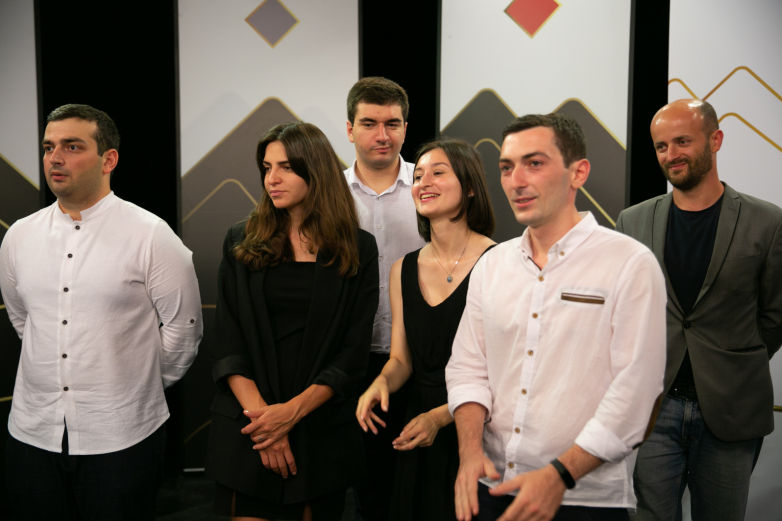
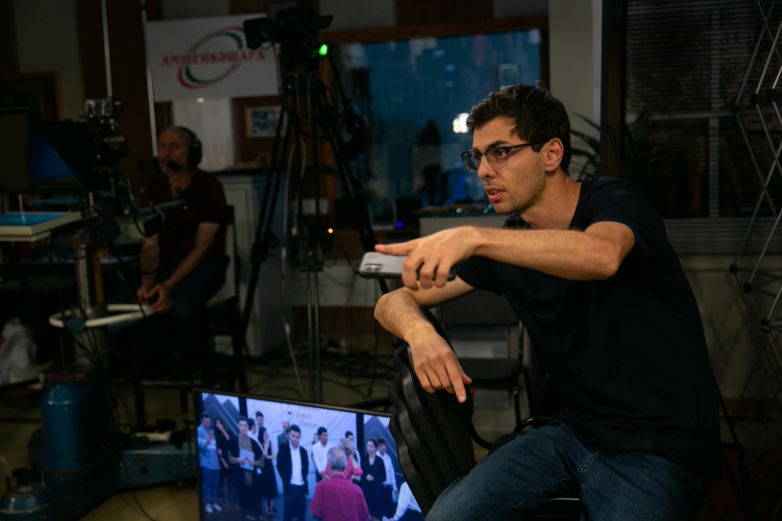
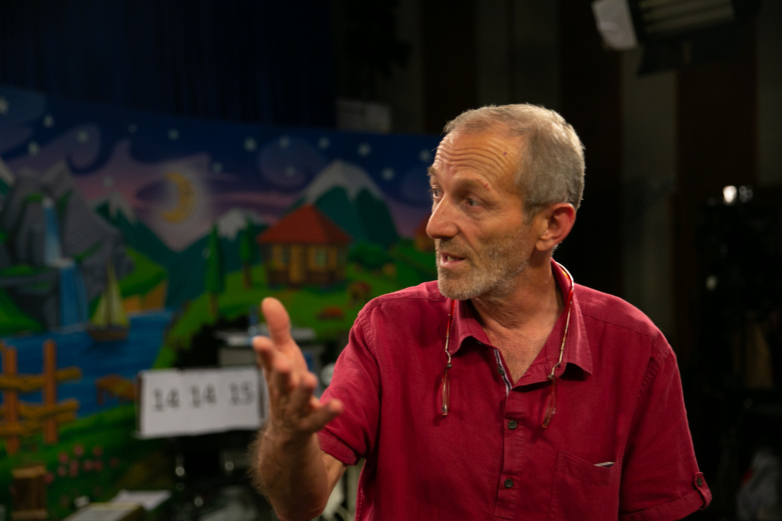
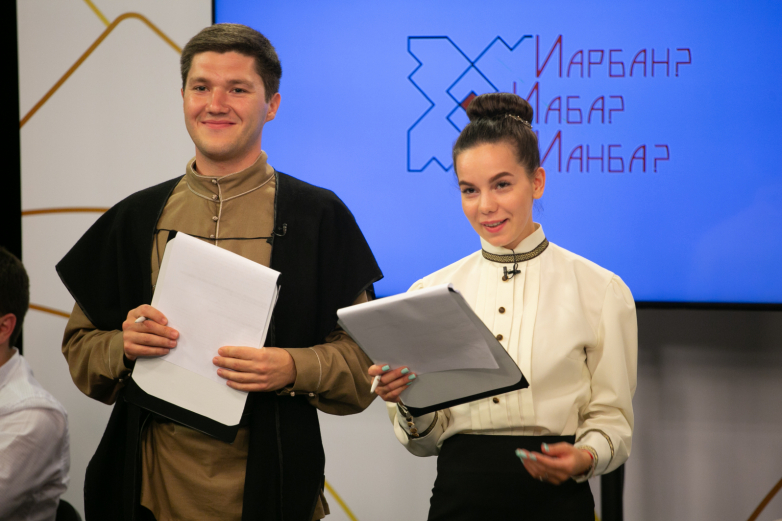
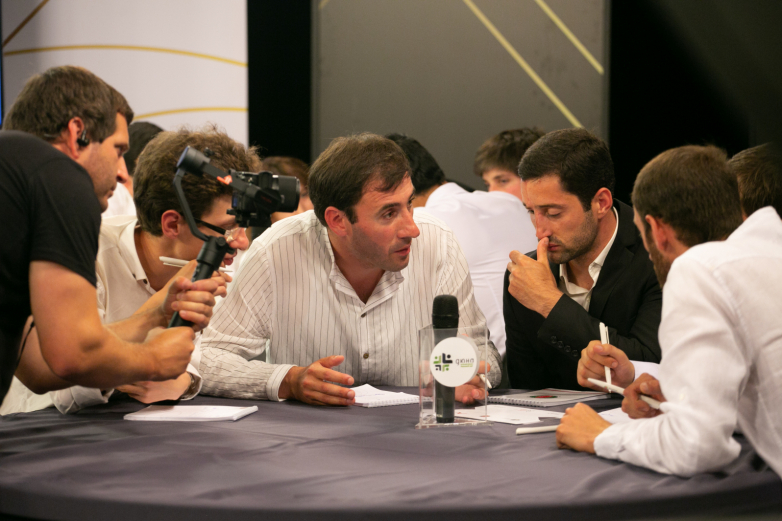
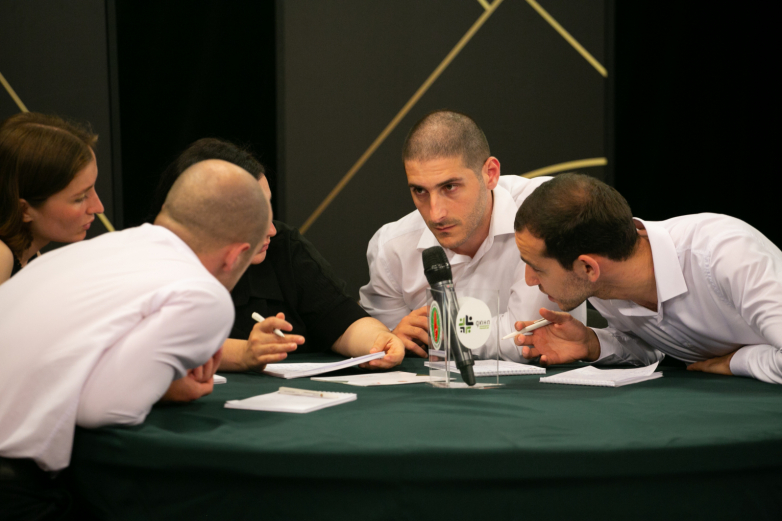
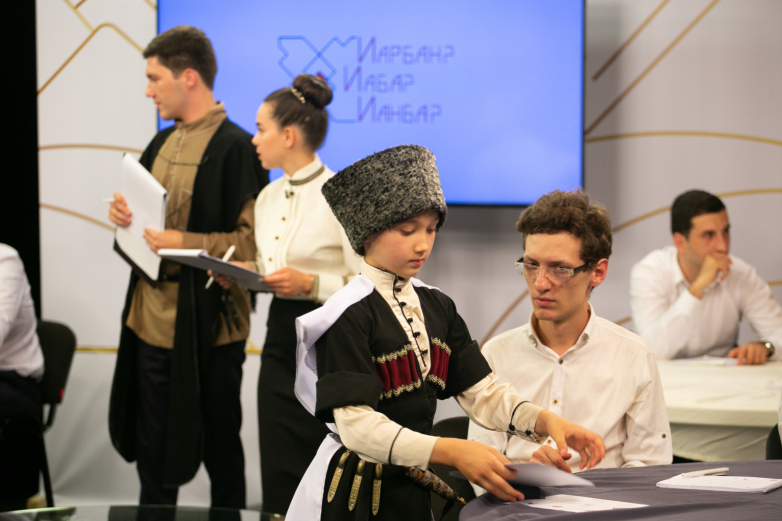
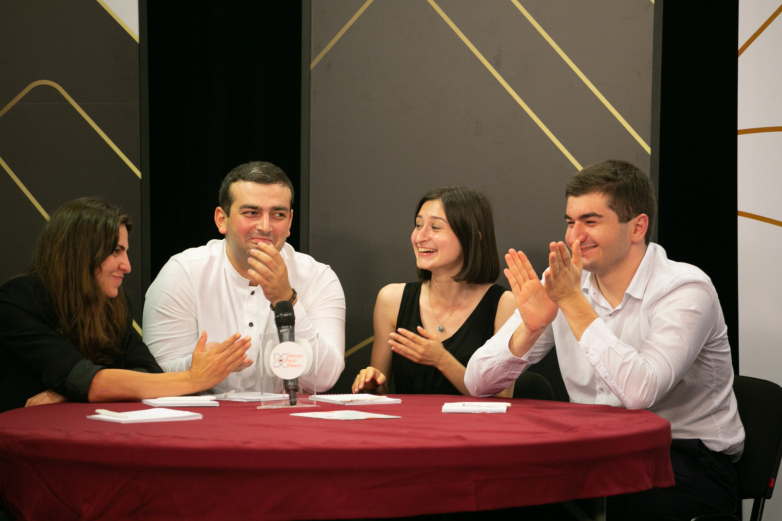
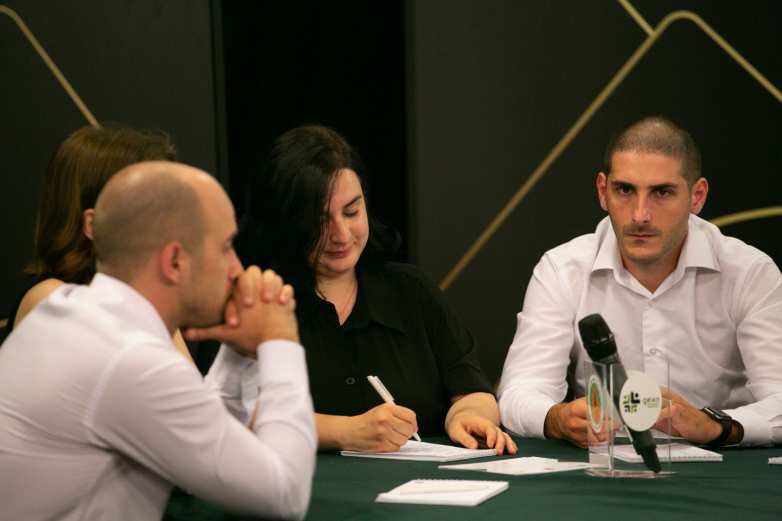
to login or register.